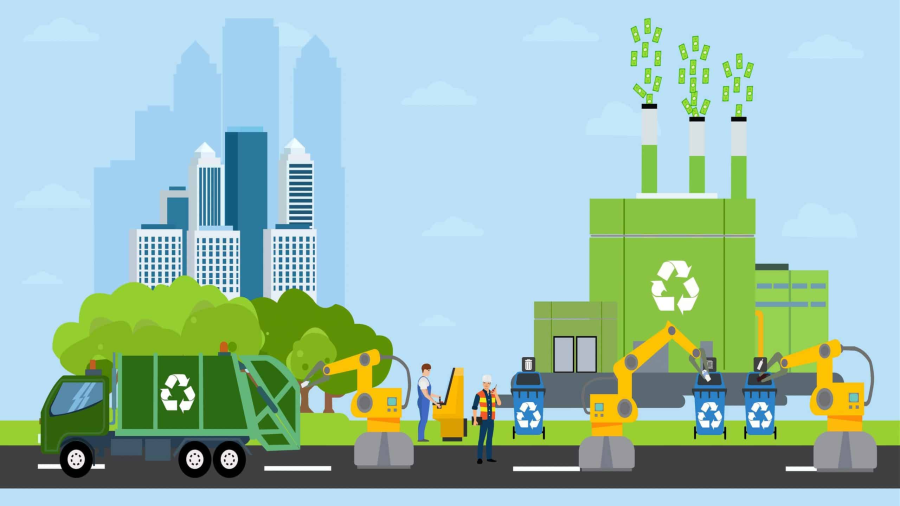According to current projections, more than two billion tonnes of rubbish would be generated globally by 2050.
Urbanization and the emergence of consumer culture have fueled a significant rise in the number of homeless people in recent decades, and neither is expected to slow down at any time soon.
Communities around the world including in Raleigh NC were turning to smart waste management technologies and solutions in an effort to lessen the impact on environment and waste collection services.
What Is Smart Waste Management
The term “smart waste management” refers to any method which uses technology to make trash collections more efficient, environmentally beneficial and cost-effective.
A monitoring technology known as Internet of Things is used to collect and track real-time data to improve waste collection and inspire future innovation in these systems.
Why Is Smart Waste Management Important
Around 75% of the trash stream in the Raleigh is recyclable, yet only 30% of recyclable items are actually recycled, according to the Environmental Protection Agency (EPA). There is a lot of rubbish in the landfills and waterways because humans produce more than 2 billion tonnes of waste each year.
Trash isn’t going away anytime soon, and existing waste management systems aren’t able to deal with the increased amount of trash produced by rising populations in the near future.
Communities must embrace smart waste management technology that boost efficiency while simultaneously lowering collection costs and diverting more trash away from landfills in order to help close the gap.
Innovative Technologies Revolutionizing Waste Management
1. Smart Waste Bins
As long as people are left to their own devices, they don’t always sort their rubbish into the appropriate bins.
Bin-e, an Internet-of-Things (IoT)-based smart garbage bin, was introduced in 2018 and is designed to automatically sort rubbish. It uses the combination of electronic and mechanical components, as well as software and artificial intelligence, to perform its functions.
Bin-e automatically recognises, separates, and compresses garbage. This can reduce waste management expenses by up to 80% and significantly increase the employee efficiency
2. Waste Level Sensors
Across the country, residents and businesses rely on regular trash collection services to remove their trash. Although weekly services have been around for a long time, it is not necessarily the most effective method.
Companies and municipalities can put garbage level sensors on bins and dumpsters of any size to help reduce unnecessary visits to landfills. In order to estimate how often bins have to be emptied, these devices collect and store data on fill levels, which allows collection agencies to plan ahead of time.
This also helps prevent public containers from overflowing or contaminating the surrounding environment when they are not being used.
3. Ai Recycling Robots
Every year, the amount of garbage that ends up in landfills and rivers is drastically reduced by recycling centers. As a result of the COVID-19 pandemic’s reduced personnel, several centers have difficulties keeping up with the demand. Enabled recycling machines can help alleviate some of the burden on humans.
Recyclable items can now be reliably identified and sorted by these robots, minimizing the requirement for human labor. Over the long term, this saves recycling facilities money and diverts materials that might otherwise wind up in landfills.
4. Garbage Truck Weighing Mechanisms
Weighing systems put in garbage trucks, similar to waste level sensors, can aid in the prediction of fill levels and the reduction of collection trips.
In order to accomplish this, they weigh garbage containers and store the weight data, which they then use to anticipate how full the containers will be over time.
Cities can utilize the technology to more correctly forecast how frequently they will need to send out their collection trucks, resulting in a reduction in annual collection expenses.
5. Pneumatic Waste Pipes
There is a growing demand for waste management solutions that can handle more trash as the population of metropolitan areas grows.
Some communities are taking on this difficulty by constructing pneumatic garbage disposal bins which connect to a series of subterranean pipelines. There is a garbage collecting plant where the trash is sorted or taken away after it travels through the pipes. Waste collection is eliminated, energy costs are slashed, and overall efficiency is improved.
6. Solar-Powered Trash Compactors
In an effort to improve collection efficiency while also reducing trips to and from the disposal center, maker Ecube Labs developed a solar-powered trash compactor that can store up to five times the amount of trash that regular trash bins can handle.
In addition to compressing waste as it accumulates in order to enhance bin capacity, these machines collect and communicate data on fill and pickup times in order to help simplify the garbage collection process.
7. E-Waste Kiosks
People and the environment can both be harmed by electronic garbage that is disposed of incorrectly. Recycle your old electronic equipment with the help of one of the many firms and organizations that now offer this service.
You may get cash for your old gadgets right there at ecoATM, an eco-friendly recycling company that has developed an entire line of kiosks where you can swap your old devices for cash.
When it comes to broken or ruined equipment, they don’t always give you money for them, but they do take them and assure that they were recycled properly.
8. Recycling Apps
Sorting through contaminated debris is one of the most difficult tasks faced by recycling facilities today.
In an effort to restrict the amount of non-recyclable waste that reaches these facilities, coders have developed apps such as RecycleNation and iRecycle which make recycling more convenient for consumers.
User-friendly information on recycling rate and center locations is provided by these apps, and their thorough listings of recyclable materials assist users in determining which products can be recycled.

